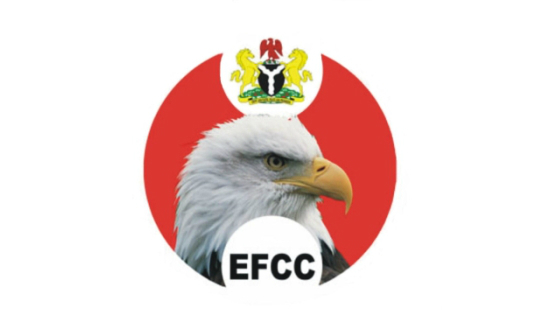The fight against corruption is being delayed by Nigeria’s slow judicial system and delay tactics by defence lawyers, the Economic and Financial Crimes Commission (EFCC) said on Sunday in Ibadan.
Mr Kazeem Oseni, the Deputy Head of its Ibadan Zonal Office, stated this at the 13th Biennial conference of Obafemi Awolowo University Muslim Graduates’ Association (UNIFEMGA), Ibadan Chapter.
His comments were contained in his paper titled “ Corruption in Nigeria: An overview and the Effort of the EFCC in Fighting the Scourge’’.
“The EFCC is committed to the anti-corruption war; we have made some progress but the operating environment has not been very encouraging.
“Issues bordering on legal technicalities, lack of cooperation from States and local governments and public attitude towards corruption keep undermining our efforts to tame the menace,” he said.
Oseni said that the commission was responding to the challenges by enhancing the capacities of its operators and exposing them to the requisite skills required for efficiency.
“We want to ensure that every investigation is properly carried out; we want to make sure that there are no escape routes for those found to be evidently corrupt,” he said.
The official called for massive support for the commission, pointing out that the EFCC could only work with information offered by members of the public.
“We all have roles to play, either as individuals or corporate entities. It is when we change our attitude and support the fight that it can succeed,” he said.
Also Speaking, Prof. Abdul-Afis Oladosu, a lecturer at the Department of Arabic and Islamic Studies, University of Ibadan, suggested that only spiritual and morally sound persons be trusted with positions of authority.
“If we are to succeed in the fight against corruption, positions of authority should be restricted to people of sound moral standing. Unless we do that, it will be difficult to uproot corruption from its roots,” he said.
Oladosu’s views were contained in a paper titled: “Combating Corruption: Role of Religious Leaders’’.
The lecturer said that appointing people of questionable character was a risky venture and threat to the nation’s socio-economic and political growth.
He urged religious leaders to tighten their control of politicians, and warned them against compromising moral standards for earthy rewards.
The university don cautioned religions leaders and incompetent scholars against misinterpreting the scriptures just to justify their actions.
“Politicians engage in material corruption and religious leader engage in spiritual corruption. Politicians steal from the nation’s purse while religious leaders steal from God’s purse. These are all corrupt tendencies,” he said.
He said that any discussion on the role of religious leaders in combating corruption must begin with the monitoring of the attitude of any person seeking to occupy a position of authority.
“Knowledge of evil and refusal to combat it is double punishment,’’ the lecturer said.
Earlier, Mr Munir Ademola, Chairman of Ibadan chapter of UNIFEMGA, had said that the topic was selected to offer more insight into the war against the menace by the President Buhari-led administration
Ademola said that corruption was equally fighting back from every angle, and stressed the need to educate Nigerians on the efforts of the anti-graft agencies, the challenges and what was expected of members of the public

